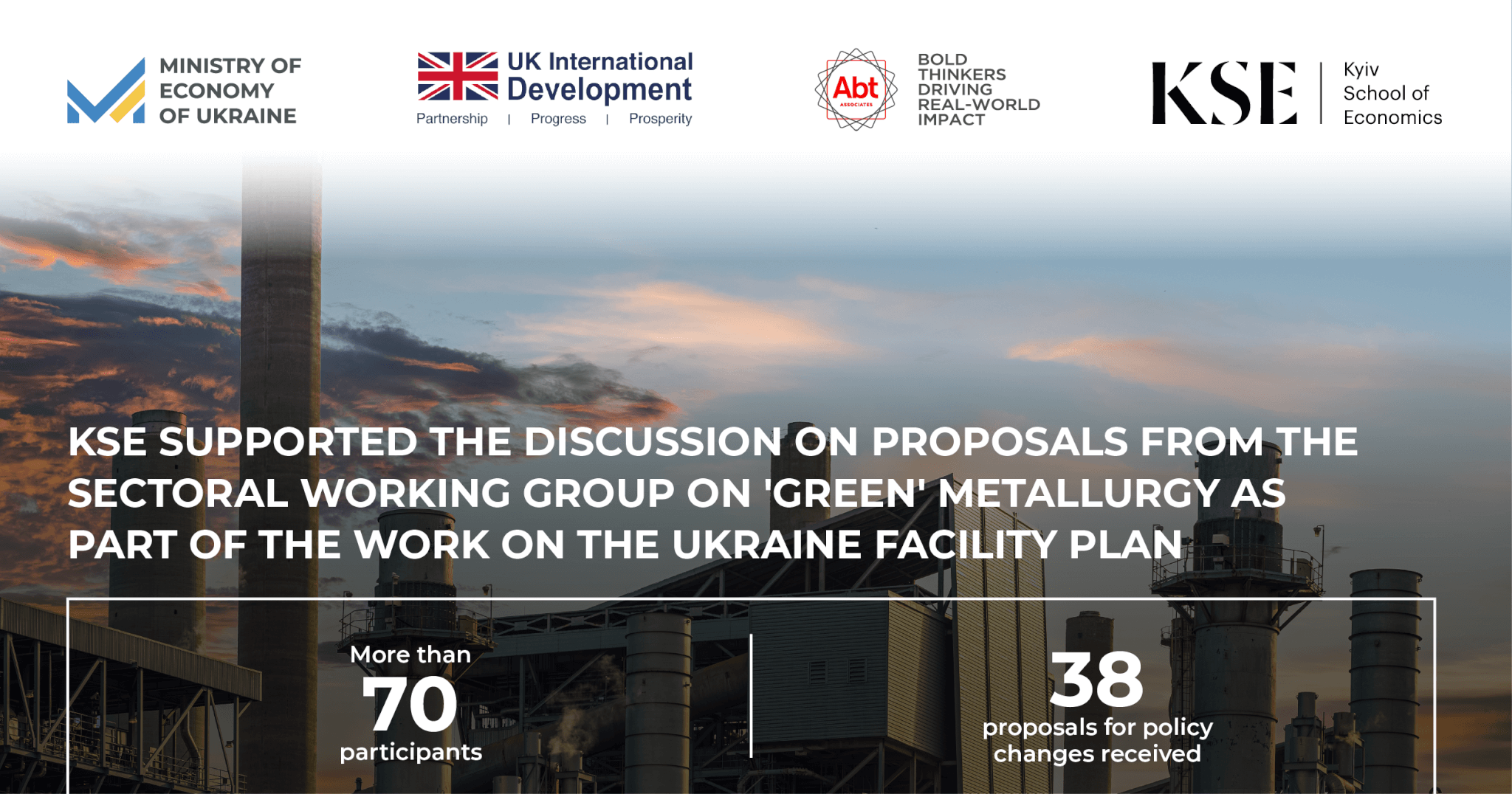- Kyiv School of Economics
- About the School
- News
- KSE Supported the Discussion on Proposals from the Sectoral Working Group on ‘Green’ Metallurgy as Part of the Work on the Ukraine Facility Plan
KSE Supported the Discussion on Proposals from the Sectoral Working Group on ‘Green’ Metallurgy as Part of the Work on the Ukraine Facility Plan
4 January 2024

The discussion was held on the proposals received from businesses as part of the work of the Sectoral Working Group on ‘Green’ Metallurgy, established under the Ministry of Economy of Ukraine, organized by the Kyiv School of Economics and moderated by McKinsey as part of the work on the Ukraine Facility Plan. More than 70 participants took part in the group’s work, contributing 38 proposals for policy changes, 35 of which were submitted to the Government for possible implementation.
Creation of the sectoral working groups is one of the activities under the Good Governance Fund Project “Economic Hub: Sound PFM Policies and Vision for Growth” funded by UK International Development”. The project delivery partners are Abt Britain and Kyiv School of Economics.
The proposed policies included reforms in the green steel and energy sector (13), steel consumption (6), enhancing the recycling economy (3), improvements in logistics (8), and financial resources (5).
After examining the proposals, 15 initiatives were recommended for implementation. They are aimed at harmonization of legislation, state support for the development of the industry, improvement of the investment climate, and state regulation. At the same time, 12 proposals require more detailed analysis, and 7 initiatives were taken into account in the energy and logistics sectors.
“Metallurgy holds one of the key positions in the economic structure. Historically, Ukraine has been one of the 20 largest producers and exporters of metallurgical products, steel, pig iron and rolled products. Despite the significant negative impact of the war on the development of the industry, Ukraine’s goals and ambitions remain competitive and aligned with global trends. We have the potential to meet the needs of the green steel market in line with global decarbonization goals,” said Deputy Minister of Economy of Ukraine Oleksii Sobolev.
He also emphasized that 39 out of 50 billion euros of the Ukraine Facility program will be used to support macrofinancial stability in Ukraine. At the same time, a special investment instrument will allow investors to obtain financing through the EBRD, EIB and other international financial institutions. The program provides EUR 8 billion to cover risks in priority sectors, which should attract more than EUR 40 billion to the Ukrainian economy.
Thus, in addition to proposals for policy changes, businesses submitted suggestions for 46 investment projects with a total budget of $7.4 billion. The projects mainly relate to rolled steel (29), green steel (7), resource recycling (5), and mining (3). The proposals for green steel investment projects are mainly aimed at developing production with reduced carbon emissions, implementing DRI/HBI technologies and manufacturing value-added products, efficient resource recycling, and recycling of production waste.
“The development of the steel sector and its recovery from the effects of the war is one of the key priorities for ensuring economic stability in Ukraine. The analysis of the sectoral group’s proposals on “green” metallurgy showed that the business has a clear vision of the industry’s advancement aligned with global goals. Specifically, decarbonization, the use of modern technologies, increasing the volume of iron ore processing and ensuring a complete value chain are Ukraine’s priorities in the development of the metallurgical complex,” said Maksym Fedoseenko, Head of Strategic Projects at KSE Institute.
While the format of the Ukraine Facility Plan does not foresee investment projects, their analysis is important for identifying priority sub-sectors for development. The relevant proposals will be submitted to the Government for consideration and may be included in the long-term sectoral development strategy.
